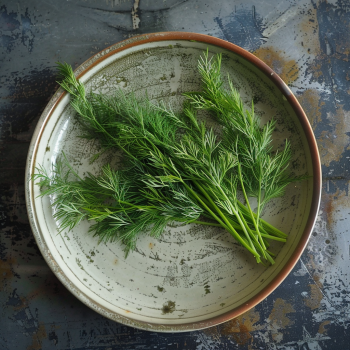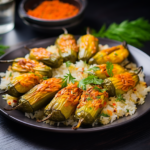As I strolled through the bustling Athens market, the aroma of freshly harvested dill wafted through the air, instantly transporting me back to my grandmother’s kitchen. The fragrant herb, with its delicate, feathery fronds, has long been the unsung hero of Greek cuisine, infusing dishes with a distinct flavor that is both soothing and invigorating.
Growing up, I fondly remember watching my grandmother meticulously chop the dill leaves, her skilled hands effortlessly blending the herb into the creamy tzatziki sauce, or sprinkling it over the vibrant Greek salad, lending a fresh and herbaceous note to the combination of feta cheese, cucumbers, and olives. It was in these moments that I first experienced the magic of dill – how a simple, yet versatile ingredient could elevate the natural flavors of the Mediterranean diet and create a truly authentic taste of Greece.
Key Takeaways
- Dill is a cornerstone of Greek cuisine, lending its distinct flavor to a variety of dishes.
- The herb’s ability to complement the tanginess of feta cheese, the crunch of cucumbers, and the briny taste of olives makes it an indispensable part of the Mediterranean diet.
- This is a versatile herb that can be used to create signature Greek flavors, from the creamy tzatziki sauce to the refreshing Greek salad.
- The aroma and flavor of dill have become synonymous with the vibrant and healthy Greek cuisine.
- Integrating dill into your cooking can help you capture the essence of the Mediterranean diet and bring a taste of Greece to your kitchen.
Unveiling the Secrets of Dill, Greek Cuisine’s Unsung Hero
Dill, with its delicate, feathery fronds and distinctive grassy-yet-citrusy aroma, has long been a staple in Greek kitchens. This hardy herb, native to the Mediterranean region, thrives in the warm, sunny climate that is characteristic of Greece. Its ability to lend a subtle, yet unmistakable flavor to a wide range of dishes has made it an integral part of the Greek cuisine and the Mediterranean diet.
Revered for its versatility, dill is a key ingredient in many beloved Greek dishes, from the creamy tzatziki sauce to the refreshing Greek salad. Its vibrant, herbaceous notes perfectly complement the tangy feta cheese, the crisp cucumbers, and the briny olives that are hallmarks of traditional Greek fare.
| Ingredient | Flavor Profile | How Dill Enhances It |
|---|---|---|
| Feta Cheese | Creamy, Salty | Dill’s grassy-citrusy aroma and flavor perfectly complement the tanginess of feta cheese, creating a harmonious balance. |
| Cucumbers | Crisp, Refreshing | The herbaceous notes of dill accentuate the natural crispness and coolness of cucumbers, making them an ideal pairing. |
| Olives | Briny, Earthy | Dill’s subtle, peppery undertones help to balance the brininess of olives, resulting in a delightful flavor combination. |
The symbiotic relationship between dill and the quintessential ingredients of Greek cuisine is a testament to the herb’s ability to enhance and elevate the natural flavors of the dishes it graces. From the vibrant Greek salad to the creamy tzatziki, the presence of this unsung hero herb is what truly defines the authentic taste of Greece.
Dill, Greek Cuisine
In Greek cuisine, dill is ubiquitous, finding its way into a vast array of dishes, from the classic Greek salad to the creamy tzatziki sauce. Its fresh, herbaceous notes perfectly complement the tanginess of feta cheese, the crunch of cucumbers, and the briny flavor of olives, creating a truly authentic taste of Greece.
Whether it’s used to garnish a plate of gyros or as a key ingredient in a traditional tzatziki dip, this is a staple in the Greek culinary repertoire. Its ability to enhance the natural flavors of the region’s produce, such as feta cheese and cucumbers, makes it an indispensable part of the Mediterranean diet.
From the vibrant Greek salad, where it adds a refreshing touch, to the creamy, herb-infused tzatziki that accompanies many Greek dishes, this versatile herb is woven throughout the tapestry of Greek cuisine, elevating the overall experience with its unmistakable aroma and taste.
| Dish | Role of Dill |
|---|---|
| Greek Salad | Adds a refreshing, herbaceous note to the tangy feta cheese, crunchy cucumbers, and briny olives. |
| Tzatziki Sauce | Provides a creamy, herb-infused base for this classic Greek condiment, complementing the richness of the yogurt and the tanginess of the feta cheese. |
| Gyros | Elevates the flavors of the grilled meat and vegetables, adding a touch of freshness and complexity to the dish. |

Pairing Dill with Feta, Cucumbers, and Olives
The synergy between this herb and the quintessential ingredients of Greek cuisine is truly remarkable. This aromatic herb‘s bright, slightly peppery notes perfectly complement the creamy, salty goodness of feta cheese, creating a flavor profile that is both refreshing and satisfying.
When combined with crisp cucumbers and briny olives, it elevates the natural flavors of these Mediterranean staples, infusing the entire dish with a vibrant, herbaceous essence. This harmonious blend of flavors is a hallmark of the Mediterranean diet, where the use of fresh, seasonal ingredients is celebrated.
| Ingredient | Contribution to Greek Cuisine |
|---|---|
| Dill | Provides a bright, slightly peppery note that complements the creamy, salty feta cheese and briny olives. |
| Feta Cheese | Offers a creamy, salty goodness that balances the flavors of the dish. |
| Cucumbers | Contribute a refreshing crunch and hydrating properties to the dish. |
| Olives | Lend a briny, savory element that ties the flavors of the dish together. |
The harmonious interplay of these quintessential Greek cuisine ingredients, all elevated by the presence of fragrant dill, is a testament to the richness and complexity of this vibrant culinary tradition.
Conclusion
In my exploration of the role of dill in Greek cuisine, I’ve come to appreciate this aromatic herb’s profound impact on the flavors and traditions of this vibrant culinary culture. As an integral part of the Mediterranean diet, it possesses a remarkable ability to elevate the natural flavors of the ingredients it accompanies, making it an indispensable component of many beloved Greek dishes.
From the refreshing Greek salad to the creamy tzatziki sauce, its distinctive flavor and aroma have become deeply woven into the fabric of Greek cooking. Its versatility and ability to complement a wide range of ingredients, from feta cheese to cucumbers and olives, have solidified its status as a culinary herb that is truly essential to the flavors of Greece.
As I reflect on my exploration in Greek cuisine, I am left with a deeper appreciation for the nuances and complexities that make this Mediterranean diet so remarkable. The harmonious interplay of flavors and aromas that it brings to the table is a testament to the richness and diversity of this captivating culinary tradition.
What is the significance of dill in Greek cuisine?
Dill, a fragrant herb with a distinct flavor, is a cornerstone of Greek cuisine. It has long been revered for its ability to elevate the natural flavors in Greek culinary creations, from the tangy tzatziki sauce to the refreshing Greek salad.
How does dill complement other ingredients in Greek dishes?
The synergy between dill and the quintessential ingredients of Greek cuisine is truly remarkable. The herb’s bright, slightly peppery notes perfectly complement the creamy, salty goodness of feta cheese, creating a flavor profile that is both refreshing and satisfying.
Why is it considered an integral part of the Mediterranean diet?
With its delicate, feathery fronds and distinctive grassy-yet-citrusy aroma, has long been a staple in Greek kitchens. This hardy herb, native to the Mediterranean region, thrives in the warm, sunny climate that is characteristic of Greece. Its ability to lend a subtle, yet unmistakable flavor to a wide range of dishes has made it an integral part of the Greek culinary tradition and the Mediterranean diet.
In what types of Greek dishes can it be found?
In Greek cuisine, it is ubiquitous, finding its way into a vast array of dishes, from the classic Greek salad to the creamy tzatziki sauce. Its fresh, herbaceous notes perfectly complement the tanginess of feta cheese, the crunch of cucumbers, and the briny flavor of olives, creating a truly authentic taste of Greece.
Honey Garlic Chicken
Discover a delightful blend of sweet and savory in this easy-to-make Honey Garlic Chicken recipe. Perfect for weeknight dinners or special occasions, this dish features tender chicken glazed with a rich honey garlic sauce. Serve it with a side of steamed vegetables or rice for a complete meal.
Honey Chicken Glazed
This recipe offers a perfect balance of sweet honey glaze and savory chicken. The dish is simple yet flavorful, making it ideal for busy weeknights or a casual dinner with friends. Pair it with a fresh Greek salad or roasted potatoes to enhance your meal.
Chicken Gyro Marinade
Learn how to make a flavorful marinade for traditional Greek chicken gyros. This marinade, featuring Greek yogurt, lemon juice, garlic, and herbs, ensures that the chicken is tender and full of authentic Greek flavors. Perfect for grilling or baking, these gyros are sure to be a hit at any gathering.
Greek Chicken and Potatoes
A classic Greek dish combining roasted chicken and potatoes with lemon and herbs. This hearty meal is easy to prepare and packed with flavor, making it a favorite for family dinners. Serve it with a side of tzatziki and warm pita bread for a complete Greek experience.
Greek Chicken Marinade
A versatile marinade perfect for grilling, baking, or frying chicken. Made with olive oil, lemon juice, garlic, and a mix of herbs, this marinade infuses the chicken with vibrant Greek flavors. Ideal for a variety of dishes, from salads to main courses.
Delicious Greek Chicken Souvlaki Recipe
Make authentic Greek chicken souvlaki at home with this easy recipe. Marinated in a blend of lemon juice, olive oil, and herbs, the chicken is then grilled to perfection. Serve it with pita bread, tzatziki sauce, and fresh vegetables for an authentic Greek meal.
Greek Rotisserie Chicken Recipes
Explore the secrets behind making perfect Greek rotisserie chicken. This recipe guide provides tips for marinating and slow-cooking chicken to achieve juicy, flavorful results. Pair it with traditional Greek sides like roasted potatoes and a Greek salad for a delicious feast.
Celebrity Chefs on Chef on a Bike YouTube
Greek TV Chef Anna-Maria Barouh
Facebook: Anna-Maria Barouh
Instagram: annamariabarouh
- Celebrity Chef, Food Stylist, Recipe Developer Anna Maria Barouh is our guest on Chef on a Bike. Anna-Maria is a regular on Greek Television and has a very popular food blog and is a magazine contributor.
- YouTube Episode: Chef on a Bike YouTube Episode


















